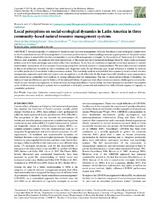Local perceptions on social-ecological dynamics in Latin America in three community-based natural resource management systems
Autor
Delgado Serrano, María del Mar
Oteros-Rozas, Elisa
Vanwildemeersch, Pieter
Ortiz-Guerrero, Cesar E.
London, Silvia
Escalante Semerena, Roberto I.
Editor
Resilience AllianceFecha
2015Materia
ArgentinaColombia
Common-pool resources
Environmental challenges
Governance
Mexico
Network analysis
Ostrom
Prospective structural analysis
Social-ecological resilience
METS:
Mostrar el registro METSPREMIS:
Mostrar el registro PREMISMetadatos
Mostrar el registro completo del ítemResumen
Several examples of community-based natural resource management in Latin American social-ecological systems exist
in which communities control the management of common-pool resources. Understanding community perceptions of the performance
of these systems is essential to involve communities in sustainable management strategies. In this analysis of three areas in Colombia,
Mexico, and Argentina, we analyzed the local perceptions of the social and environmental challenges faced by these social-ecological
systems and how these challenges and drivers affect their resilience. To do this, we combined prospective structural analysis to unravel
stakeholders’ perceptions of each system’s functioning along with network analysis to assess resilience. We identified external variables
as the most influential variables in the Colombian and Argentine cases. In the Mexican case, larger influence is exerted by internal
variables, particularly those linked to the governance system. The case study analysis revealed that the community-based natural resource
management approach needs external support and recognition to work effectively. In the Argentine and Colombian cases, megaprojects
were perceived as controllers with medium or strong influence but low dependence. The use of ancestral knowledge (Colombia), the
history of land use (Mexico), and the history of the artisanal fishery (Argentina) were all perceived as common challenges to communitybased
natural resource management. In terms of social-ecological resilience, framed within the three-dimensional model of the adaptive
cycle, all three social-ecological systems were considered to be highly connected and resilient but with different degrees of capacity or
cumulative potential.

